Enrique Hernández
@ehernandez.bsky.social
Political scientist at the Autonomous University of Barcelona. Working on public opinion, political attitudes and democracy
www.enriquehernandez.eu
www.enriquehernandez.eu
3. And a clear (descriptive) underrepresentation of rural areas
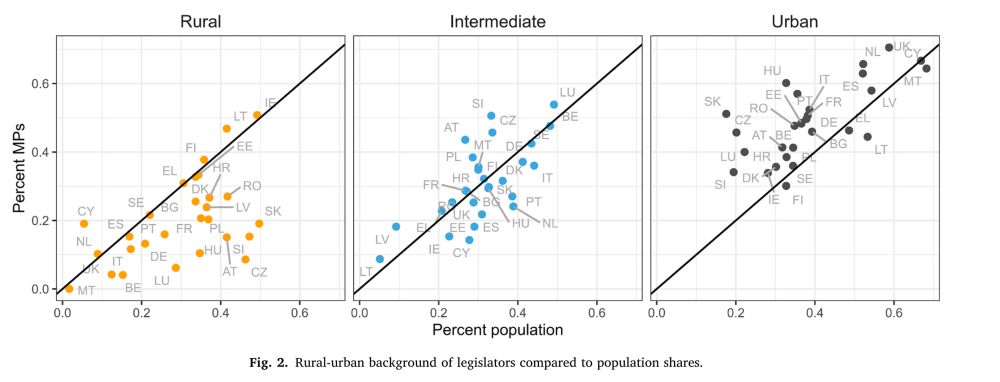
July 2, 2025 at 7:59 AM
3. And a clear (descriptive) underrepresentation of rural areas
2. Some variation across party families
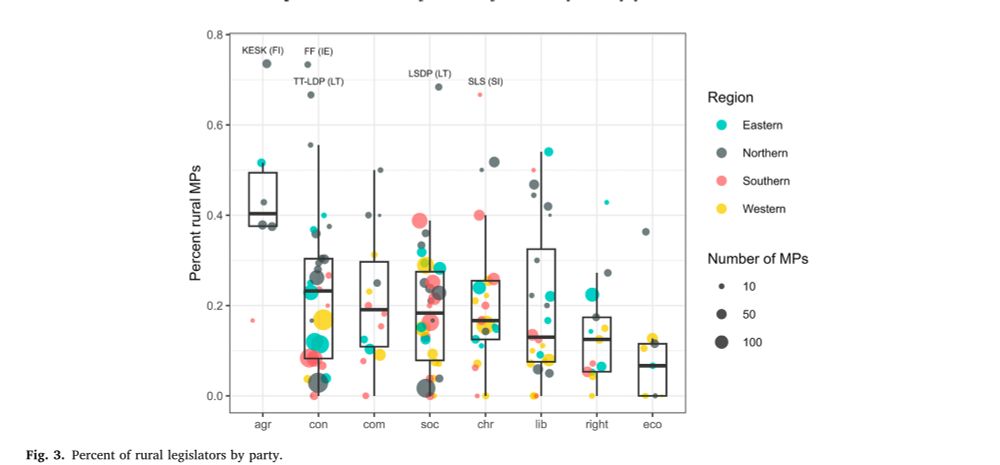
July 2, 2025 at 7:59 AM
2. Some variation across party families
We find:
1. A wide variation in the rural and urban backgrounds of members of parliament.
1. A wide variation in the rural and urban backgrounds of members of parliament.
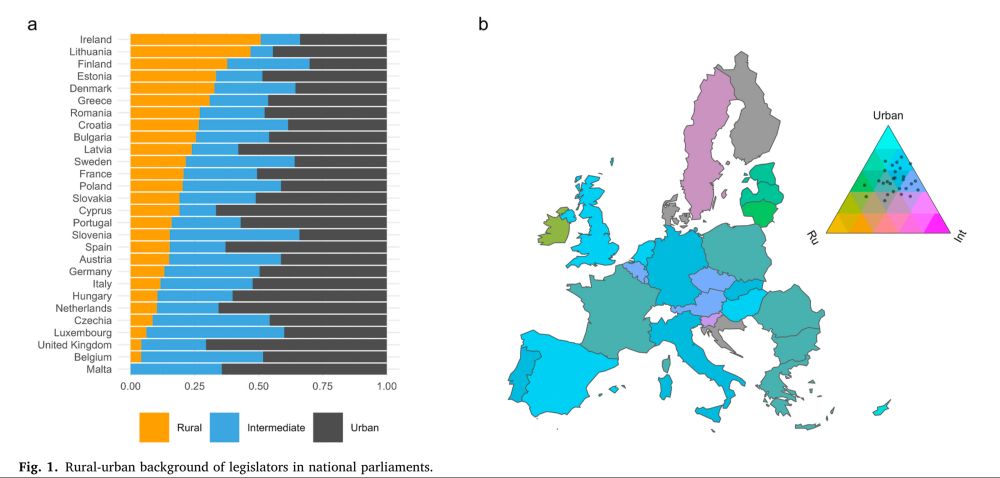
July 2, 2025 at 7:59 AM
We find:
1. A wide variation in the rural and urban backgrounds of members of parliament.
1. A wide variation in the rural and urban backgrounds of members of parliament.
@sergiferrer.bsky.social and Enrique Prada will present some of these results at the upcoming EPSA conference in Madrid
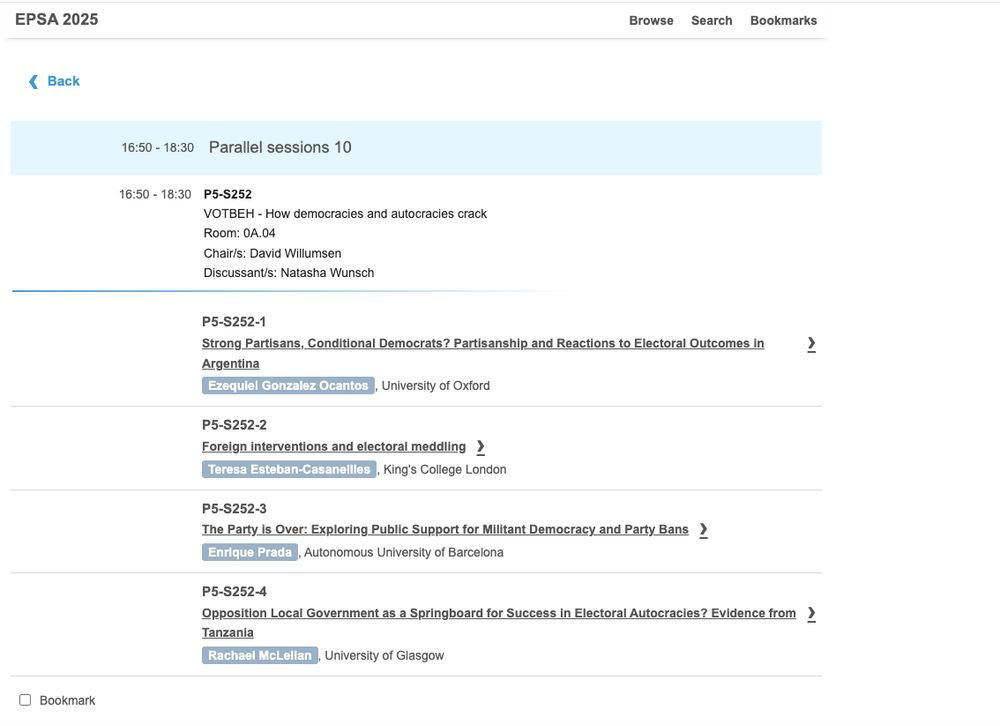
May 2, 2025 at 11:03 AM
@sergiferrer.bsky.social and Enrique Prada will present some of these results at the upcoming EPSA conference in Madrid
After asking generically, we experimentally varied the type of democratic threat a party poses
Citizens are much more willing to ban parties that justify terrorism or promote discrimination, but less so for parties that seek to appoint loyal judges.
Support varies strongly by ideology.
Citizens are much more willing to ban parties that justify terrorism or promote discrimination, but less so for parties that seek to appoint loyal judges.
Support varies strongly by ideology.
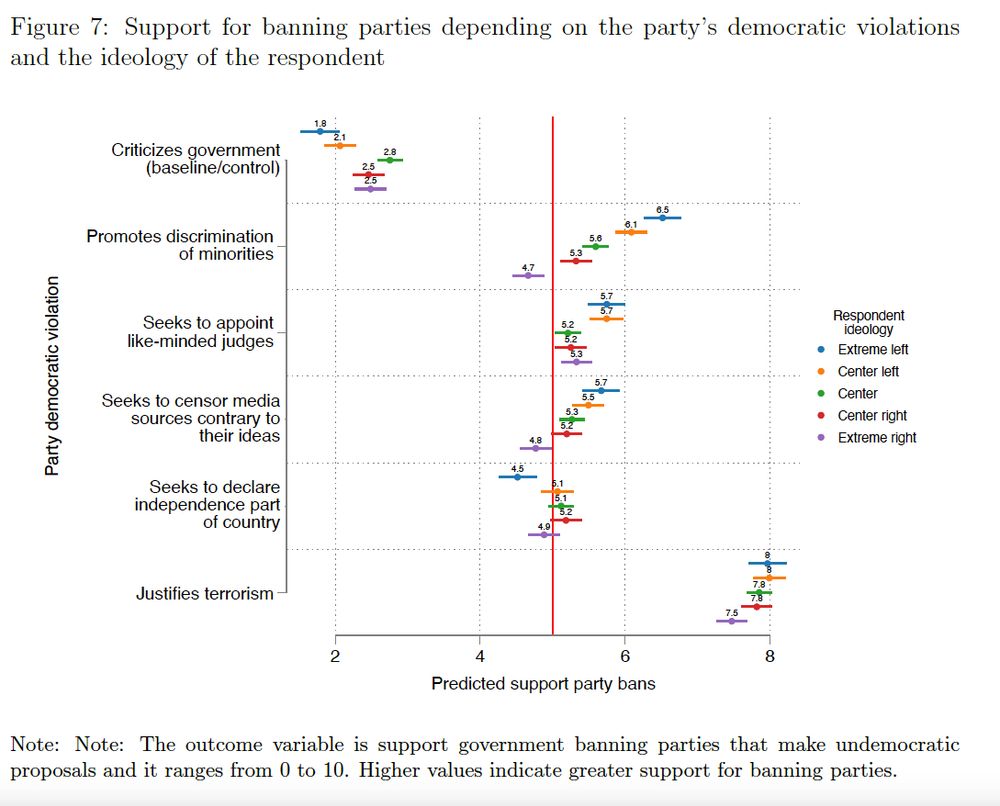
May 2, 2025 at 10:56 AM
After asking generically, we experimentally varied the type of democratic threat a party poses
Citizens are much more willing to ban parties that justify terrorism or promote discrimination, but less so for parties that seek to appoint loyal judges.
Support varies strongly by ideology.
Citizens are much more willing to ban parties that justify terrorism or promote discrimination, but less so for parties that seek to appoint loyal judges.
Support varies strongly by ideology.
People who value democracy more and those living in countries with a history of party bans are more supportive of banning parties that pose a threat to democracy
Individuals with right-wing ideology tend to be less supportive of such bans.
Individuals with right-wing ideology tend to be less supportive of such bans.
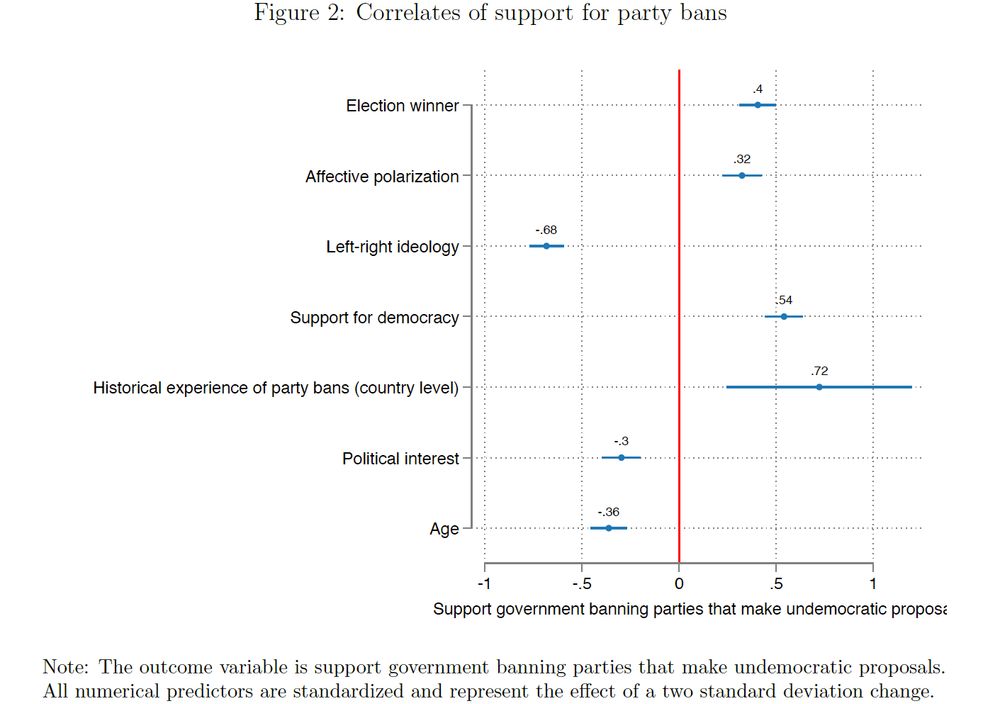
May 2, 2025 at 10:56 AM
People who value democracy more and those living in countries with a history of party bans are more supportive of banning parties that pose a threat to democracy
Individuals with right-wing ideology tend to be less supportive of such bans.
Individuals with right-wing ideology tend to be less supportive of such bans.
Should democracies ban parties that threaten democracy?
In the DEMOTRADEOFF project survey we asked people in 15 countries about this.
A short 🧵 with some results
Citizens are deeply divided about this issue
Support for bans is highest in 🇮🇱 🇮🇹 🇪🇸 🇳🇱 🇵🇹 🇨🇭 🇩🇪
www.dw.com/en/germany-i...
In the DEMOTRADEOFF project survey we asked people in 15 countries about this.
A short 🧵 with some results
Citizens are deeply divided about this issue
Support for bans is highest in 🇮🇱 🇮🇹 🇪🇸 🇳🇱 🇵🇹 🇨🇭 🇩🇪
www.dw.com/en/germany-i...
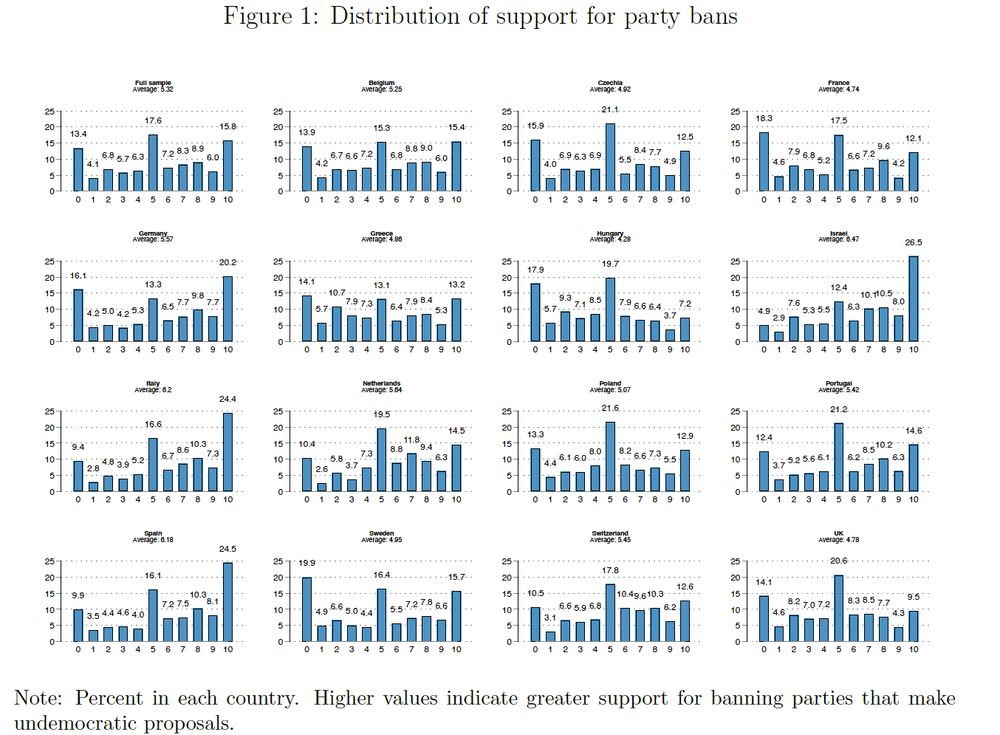
May 2, 2025 at 10:56 AM
Should democracies ban parties that threaten democracy?
In the DEMOTRADEOFF project survey we asked people in 15 countries about this.
A short 🧵 with some results
Citizens are deeply divided about this issue
Support for bans is highest in 🇮🇱 🇮🇹 🇪🇸 🇳🇱 🇵🇹 🇨🇭 🇩🇪
www.dw.com/en/germany-i...
In the DEMOTRADEOFF project survey we asked people in 15 countries about this.
A short 🧵 with some results
Citizens are deeply divided about this issue
Support for bans is highest in 🇮🇱 🇮🇹 🇪🇸 🇳🇱 🇵🇹 🇨🇭 🇩🇪
www.dw.com/en/germany-i...
2. A piecemeal process of backsliding where liberal principles are eroded gradually one by one is more likely to succeed. Illiberal leaders who move slowly are more likely to succeed

April 28, 2025 at 2:04 PM
2. A piecemeal process of backsliding where liberal principles are eroded gradually one by one is more likely to succeed. Illiberal leaders who move slowly are more likely to succeed
🗳️ Citizens are very reluctant to give up free elections, even for big income increases.
⚖️ But many would trade away liberal principles for relatively smaller economic gains.
⚖️ But many would trade away liberal principles for relatively smaller economic gains.

April 28, 2025 at 2:04 PM
🗳️ Citizens are very reluctant to give up free elections, even for big income increases.
⚖️ But many would trade away liberal principles for relatively smaller economic gains.
⚖️ But many would trade away liberal principles for relatively smaller economic gains.
Very happy to see this paper finally out.
🧵 Through a measure of willingness to pay we show:
1. Citizens value elections much more than other liberal principles (media freedom, checks and balances...), which are often eroded in backsliding processes.
ejpr.onlinelibrary.wiley.com/doi/full/10....
🧵 Through a measure of willingness to pay we show:
1. Citizens value elections much more than other liberal principles (media freedom, checks and balances...), which are often eroded in backsliding processes.
ejpr.onlinelibrary.wiley.com/doi/full/10....

April 28, 2025 at 2:04 PM
Very happy to see this paper finally out.
🧵 Through a measure of willingness to pay we show:
1. Citizens value elections much more than other liberal principles (media freedom, checks and balances...), which are often eroded in backsliding processes.
ejpr.onlinelibrary.wiley.com/doi/full/10....
🧵 Through a measure of willingness to pay we show:
1. Citizens value elections much more than other liberal principles (media freedom, checks and balances...), which are often eroded in backsliding processes.
ejpr.onlinelibrary.wiley.com/doi/full/10....
¿Por qué? La confianza es la clave
Saltarse la ley, especialmente cuando se beneficia a empresas afines, reduce la confianza en los políticos
Y aunque el político que se salta la ley es percibido como más eficiente, las ganancias en eficiencia no compensan la pérdida de confianza.
Saltarse la ley, especialmente cuando se beneficia a empresas afines, reduce la confianza en los políticos
Y aunque el político que se salta la ley es percibido como más eficiente, las ganancias en eficiencia no compensan la pérdida de confianza.

November 21, 2024 at 11:29 AM
¿Por qué? La confianza es la clave
Saltarse la ley, especialmente cuando se beneficia a empresas afines, reduce la confianza en los políticos
Y aunque el político que se salta la ley es percibido como más eficiente, las ganancias en eficiencia no compensan la pérdida de confianza.
Saltarse la ley, especialmente cuando se beneficia a empresas afines, reduce la confianza en los políticos
Y aunque el político que se salta la ley es percibido como más eficiente, las ganancias en eficiencia no compensan la pérdida de confianza.
Resultados:
- El político (c) que se salta la ley y beneficia a empresas afines recibe menos apoyo
- El más apoyado es el que sigue la ley aunque esto retrase las reparaciones (a) y no el que se salta la ley para acelerar las reparaciones sin beneficiar a empresas afines (b)
- El político (c) que se salta la ley y beneficia a empresas afines recibe menos apoyo
- El más apoyado es el que sigue la ley aunque esto retrase las reparaciones (a) y no el que se salta la ley para acelerar las reparaciones sin beneficiar a empresas afines (b)

November 21, 2024 at 11:29 AM
Resultados:
- El político (c) que se salta la ley y beneficia a empresas afines recibe menos apoyo
- El más apoyado es el que sigue la ley aunque esto retrase las reparaciones (a) y no el que se salta la ley para acelerar las reparaciones sin beneficiar a empresas afines (b)
- El político (c) que se salta la ley y beneficia a empresas afines recibe menos apoyo
- El más apoyado es el que sigue la ley aunque esto retrase las reparaciones (a) y no el que se salta la ley para acelerar las reparaciones sin beneficiar a empresas afines (b)
En el experimento manipulamos si el político:
a. Sigue la ley, aunque esto retrase las reparaciones
b. Se salta la ley y acelera las reparaciones, pero sin beneficiar a ninguna empresa afín a su partido
c. Se salta la ley y acelera las reparaciones, pero beneficia a empresas afines a su partido
a. Sigue la ley, aunque esto retrase las reparaciones
b. Se salta la ley y acelera las reparaciones, pero sin beneficiar a ninguna empresa afín a su partido
c. Se salta la ley y acelera las reparaciones, pero beneficia a empresas afines a su partido

November 21, 2024 at 11:29 AM
En el experimento manipulamos si el político:
a. Sigue la ley, aunque esto retrase las reparaciones
b. Se salta la ley y acelera las reparaciones, pero sin beneficiar a ninguna empresa afín a su partido
c. Se salta la ley y acelera las reparaciones, pero beneficia a empresas afines a su partido
a. Sigue la ley, aunque esto retrase las reparaciones
b. Se salta la ley y acelera las reparaciones, pero sin beneficiar a ninguna empresa afín a su partido
c. Se salta la ley y acelera las reparaciones, pero beneficia a empresas afines a su partido
Very happy to see this paper on the rural 🚜 urban 🏙️ divide out in @wepsocial.bsky.social
Together with Rubén Garcia del Horno and Guillem Rico we show that rural residents feel political elites are less responsive to their demands
t.co/9gMIvuFRsC
Together with Rubén Garcia del Horno and Guillem Rico we show that rural residents feel political elites are less responsive to their demands
t.co/9gMIvuFRsC
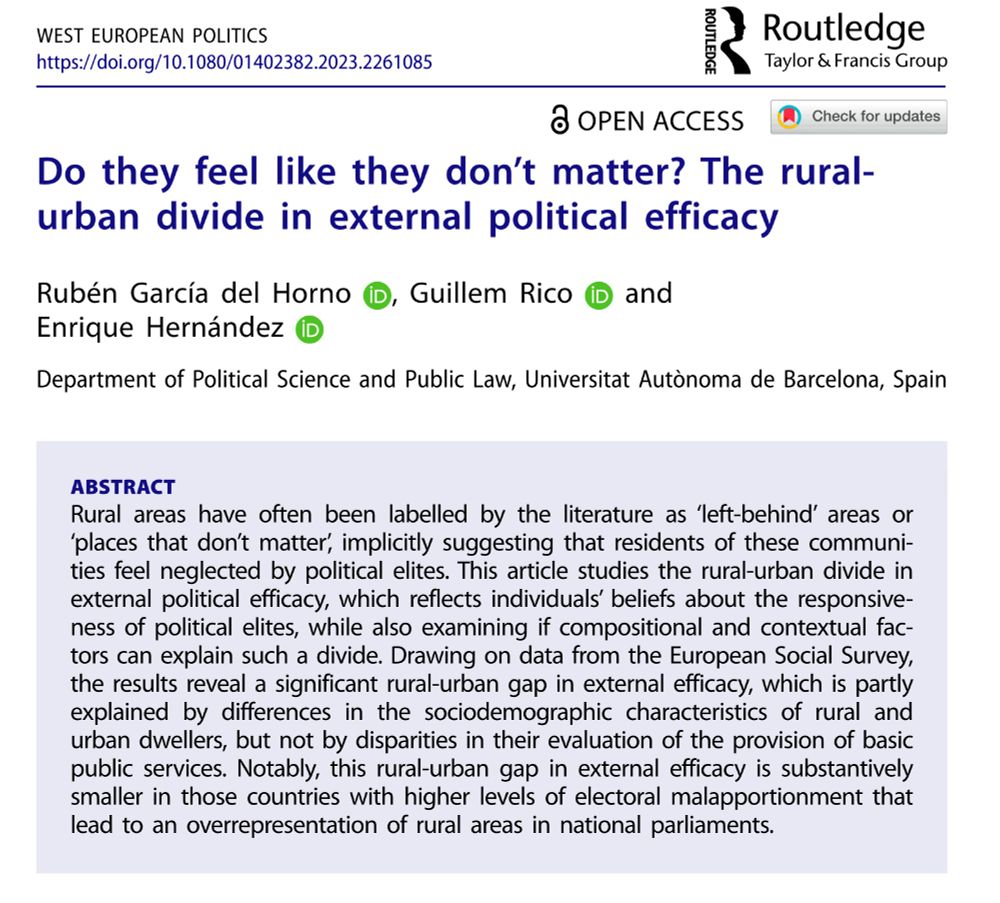
October 25, 2023 at 7:16 AM
Very happy to see this paper on the rural 🚜 urban 🏙️ divide out in @wepsocial.bsky.social
Together with Rubén Garcia del Horno and Guillem Rico we show that rural residents feel political elites are less responsive to their demands
t.co/9gMIvuFRsC
Together with Rubén Garcia del Horno and Guillem Rico we show that rural residents feel political elites are less responsive to their demands
t.co/9gMIvuFRsC
📣 New paper with @macarenaares.bsky.social on the impact of Russian invasion of Ukraine on attitudes toward democracy
The invasion didn't alter Europeans' support/satisfaction with democracy or the importance they attribute to democratic principles.
journals.sagepub.com/doi/10.1177/...
polisky
The invasion didn't alter Europeans' support/satisfaction with democracy or the importance they attribute to democratic principles.
journals.sagepub.com/doi/10.1177/...
polisky
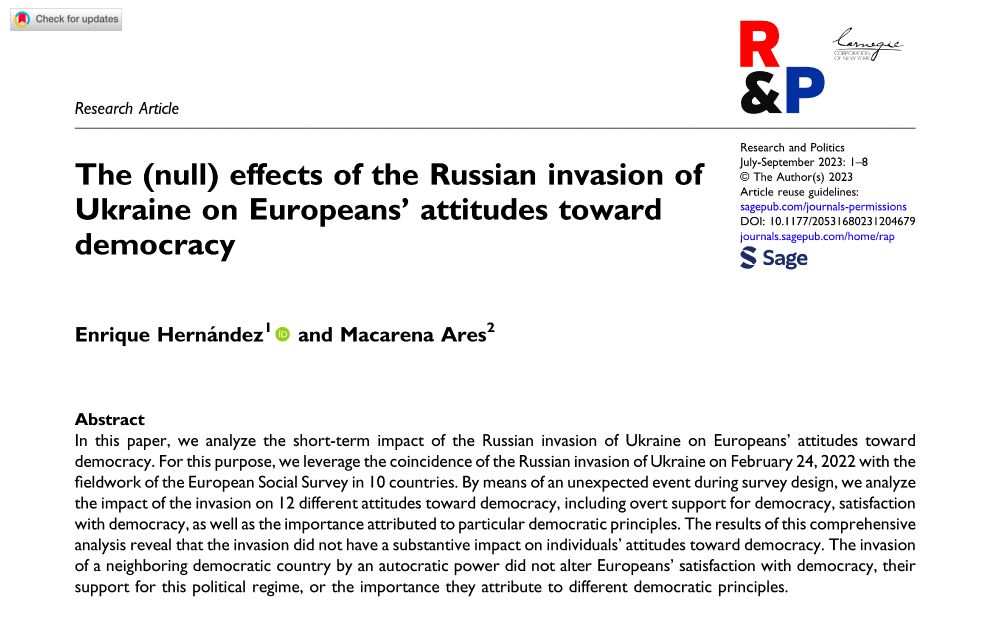
October 2, 2023 at 7:22 AM
📣 New paper with @macarenaares.bsky.social on the impact of Russian invasion of Ukraine on attitudes toward democracy
The invasion didn't alter Europeans' support/satisfaction with democracy or the importance they attribute to democratic principles.
journals.sagepub.com/doi/10.1177/...
polisky
The invasion didn't alter Europeans' support/satisfaction with democracy or the importance they attribute to democratic principles.
journals.sagepub.com/doi/10.1177/...
polisky

